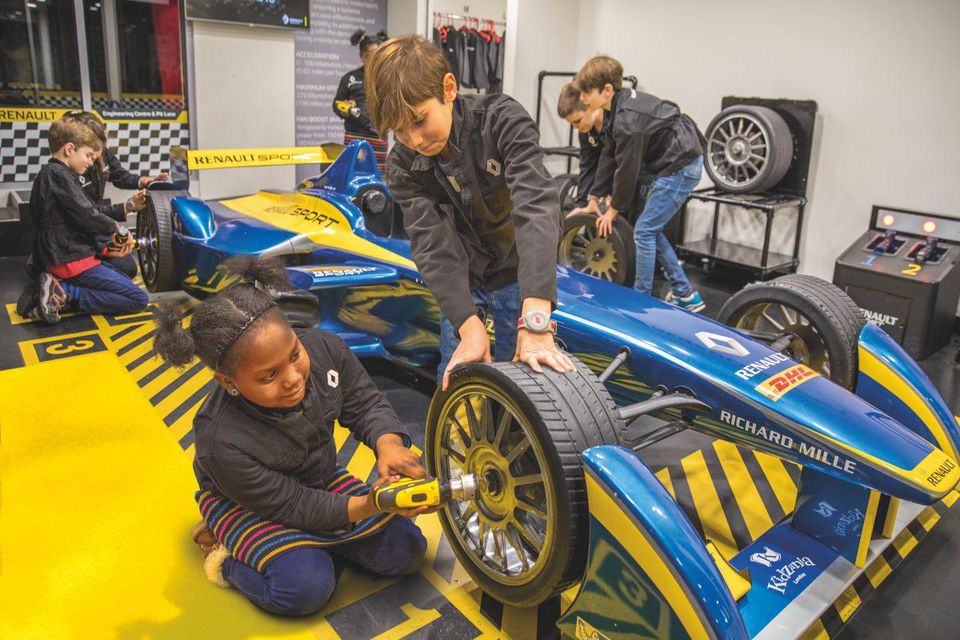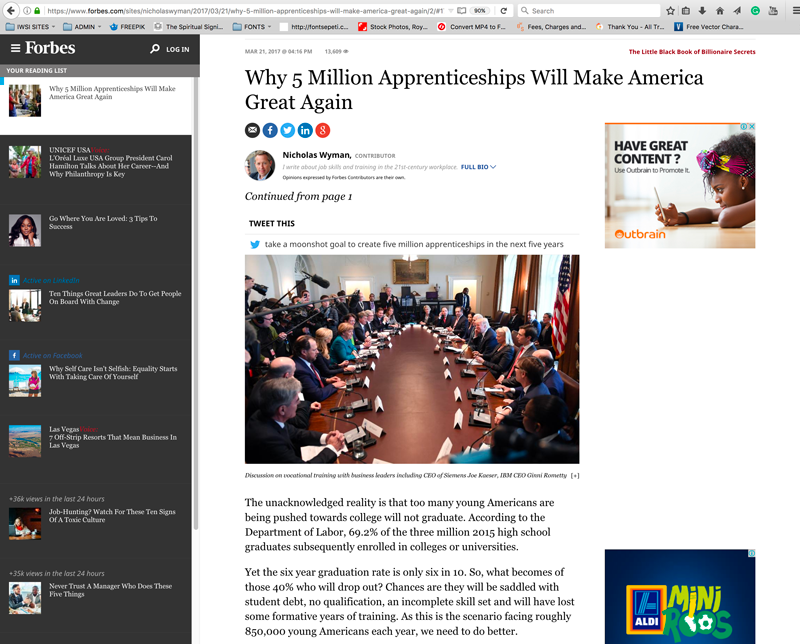
By Nicholas Wyman.
Rhode Island-based CVS Health (CVSH) is a major U.S. employer, with nearly 300,000 people on its payroll. It is also the first American employer to have initiated a registered apprenticeship program for pharmacy technicians. Since 2005 over 8,000 individuals have signed on to that earn-while-you-learn program, making CVSH one of the most experienced U.S. sponsors of a non-traditional occupation apprenticeship. It has also launched apprenticeships for aspiring retail store managers, logistics supervisors and prescription benefits manager pharmacy technicians.
The company’s beginning apprentices, according to David Casey, vice president, workforce strategies and chief diversity officer, CVS Health, come from a diverse swath of the population: recent high school grads, youngsters who haven’t found a way into the workforce, middle aged people seeking a career change and military veterans.
CVS Health has doubled down on its initial commitment in November 2017 when it announced its intention to hire 5,000 new apprentices by 2022, and to expand its programs from 11 states to 18. That expansion coincides with the U.S. Department of Labor’s call to vastly increase the number of apprenticeships across industries. A growing number of companies in manufacturing, hospitality, telecommunications, IT, energy, transportation and other industries are answering the call–skilling up a new generation of employees who will help to narrow a national “skills gap” that currently stands at six million unfilled positions—the highest on record.
What’s good for the nation is, in this case, also good for participating companies. The measurable financial benefits to CVS Health, for example, have been very positive. “Apprentice training brings our people up to full productivity more quickly,” according to Casey. Perhaps the greatest beneficiaries of programs like CVSH’s are the apprentices themselves. Each receives mentor-guided entry into the workforce, and earns a wage as he or she learns a skill that companies clearly value. When their term of training ends, there is no job-hunting. They already have a job! Nationally, more than 90% of apprentices who complete their programs stay with their employers. Many go on to additional post-secondary education, and most employers provide tuition assistance if the course of study is aligned with their business needs.
Facts And Figures
- Ninety-eight percent of CVS Health registered apprentices are trained to become licensed and certified pharmacy technicians. The typical training period is one year.
- On average, CVS pharmacy stores employ five or six pharmacy technicians.
- In retail settings, pharmacy technicians must demonstrate strong consumer service skills, keep track of inventory, and achieve 100% accuracy in filling and recording prescriptions.
- Some 400,000 pharmacy technicians are currently working in the United States.
- Jobs for pharmacy technicians through 2024 will increase “faster than average.”
Like other sponsors, CVS Health has discovered that attracting qualified candidates isn’t easy. “Apprenticeships in this country,” says Casey, “have a branding problem,” and lack of awareness is part of it. Few American households have any experience with apprenticeships. Others only associate apprentice work with the building trades, and with electricians, plumbers and carpenters—not with white-collar vocations such as health care, banking, information technology, and management. The list of apprenticeships registered with the U.S. Department of Labor is broad, covering over 1,000 careers! Nor will many parents or high school counselors recommend an apprenticeship as a pathway to a working career. To them, a college education is the only reliable path to a good paying job and a secure future. In an era of high college dropout rates (roughly 50%) and crushing student debt, that sort of thinking is dangerously out of date. Yet, it dominates the advice given to young Americans today.
CVS Health has risen to the “branding problem” through pre-apprenticeships that it instituted in collaboration with state and local governments, public workforce agencies, community colleges, youth-focused nonprofits, and faith-based organizations. Those partners, about 1200 nationwide, connect the company with promising recruits and often assess applicants’ reading, math, and computer know-how to assure that they have the skills needed to succeed. The pre-apprenticeship program builds on those capabilities and helps participants to develop the soft skills that work in a consumer retail workplace requires: good communications, the ability to work with others, timeliness and a strong work ethic.
CVS Health has used pre-apprenticeship since the program’s inception in 2005 as one of the ways to recruit diverse talent into the apprenticeship program. Incorporating pre-apprenticeship:
- Assists in keeping a full diverse talent pipeline
- Improves outcomes: pre-apprentice graduates becomeproductive employees more quickly (50% more quickly by one estimate) than employees recruited by traditional methods
- Helps the company meet its goal of hiring more people from communities served by its over 9,800 stores and 1,100 walk-in health clinics
Like leading firms in other industries, CVS Health has learned that it must take ownership of its unique training needs. “We can’t expect our school systems to equip people with the workplace habits and unique skills we require,” says Casey. Nor can it passively put out the “Help Wanted” sign and expect people with all the right stuff to appear on its doorstep. CVS Health’s commitment to doubling its apprentice ranks by 2022 is a clear signal that the healthcare giant has a human resource strategy for the future and that it’s on the right course.







